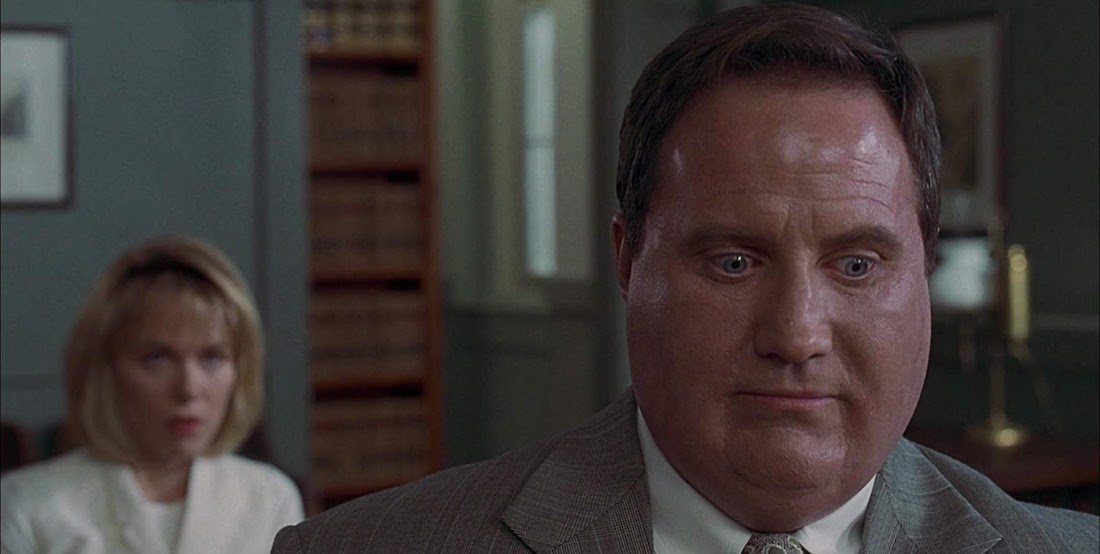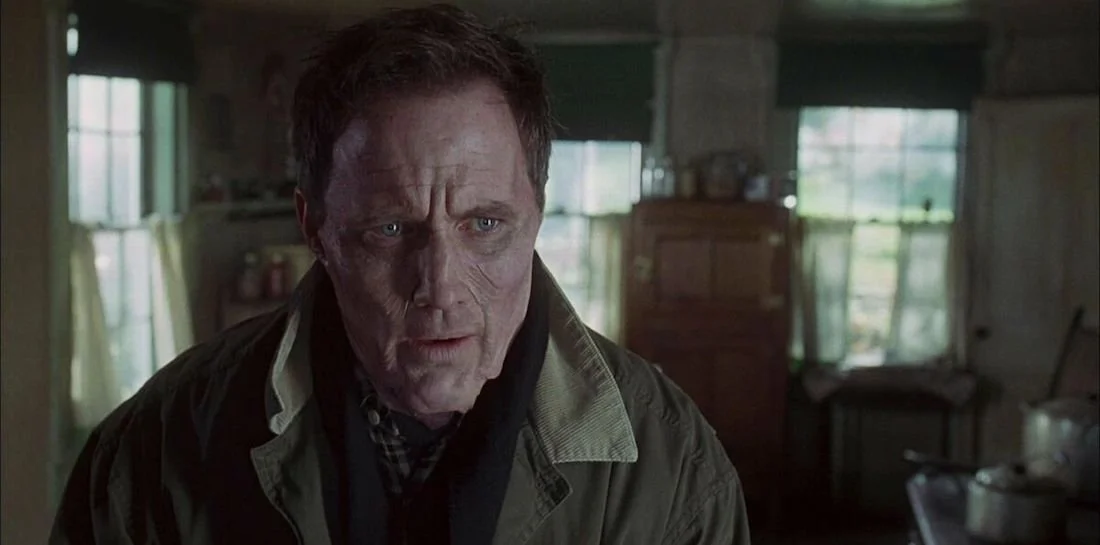THE PUMPKIN KING: THINNER (1996)
An Examination Of Curses, Justice, Corruption, and Morals Make It Worth A Revisit
In the pantheon of Stephen King movies, there are usually three distinct groups: the perennial classics, the cult classics, and the movies that people straight-up despise. Strangely, given the vast, vast number of movies that have been adapted from his various books and novellas over the years, the “forgotten” films that bear the name “Stephen King” are still more interesting than your usual commercial flop. Nowhere is this better exemplified than with the stab that director Tom Holland (who co-wrote the adaptation with Michael McDowell) took back in 1996 with THINNER. A film that’s not bad, not great, and at times entirely unsure of what exactly it wants to be, it carves out a memorable space that deserves a second watch. Because the more closely you peer into the abyss that is this movie, the more weirdness you are sure to uncover.
Starting at the very beginning THINNER is a film that delights in examining people inhabiting grey regions of life. Billy Halleck (Robert John Burke) is your basic movie defense attorney. He's good at his job, regardless of if he's protecting your average Joe or a mobster like Richie "The Hammer" Ginelli (Joe Mantegna). Even though it's a task made easier due to his willingness to “accept pointers” granted to him by the local Judge Rossington (John Horton). The same goes for Police Chief Hopley (Daniel von Bargen). While he isn’t necessarily using excessive force all time, he's willing to bend the rules to serve the interest of the more “elite.” In this case, removing a roving band of Romani travelers.
Call it an air of smug corruption or just “the good ole days,” but the sleepy New England haven isn’t exactly on the up-and-up. So, when Billy boy ends up doing a little vehicular manslaughter, he’s naturally able to get off scot-free. That initial setup kicks the movie into full swing, as an elderly gypsy Tadzu Lempke (Michael Constantine) curses Billy, Rossington, and Hopley for their actions in denying justice for his daughter’s murder. Toss in Mantegna fighting (both figuratively and literally) Kari Wuhrer over which of them can chew the most scenery, a lot of seeping blood, gross ingestion of foodstuff, and great effects work bringing Billy’s transformation to life and you’ve got a full, if not mediocre movie. Your mileage may vary, but there isn't a bad time to be had here. Only an uneven one.
It should be noted, before getting into the meat and potatoes, that in 2022 there are about 20 things that can put THINNER into time out, or at the very least wear a sign around its neck that reads “problematic.” A character wears a garish-looking fat suit. One that only makes him look more "other" the fewer clothes he wears. Yet there's weirdly goofy energy that pervades every scene, beckoning you to see what happens now. And if that doesn't draw you in, the film also secrets away an at times compelling undercurrent of complexities involving corruption, morals, justice, and curses.
If the above sounds confounding at all, that's ok. Were you to toss this on in the background, it would merely highlight how over-the-top things get. Forcing yourself to view this in a more critical light, well, things take on a slightly different tenor. That strange quirky heightened tone is still at the forefront, only with it does a series of weird and intriguing ideas start to poke through the surface. None of them are explored as fully as you'd hope, but their mere inclusion is a curiosity. Showing that extra thought went into not just the plight of these characters, but how the world revolves around more grey complexities than could be expected. Were you to look close enough, that is.
One of the key focal points in the story, and the overall driving force, is the series of curses that befall three of the characters. From afar they seem just like a little throw away conceits. Ones onto which effects mavens and can play with in the makeup. Yet they also hold to the cores of each of the men. Rossington is cursed with scales, slowly turning him into a lizard while also symbolizing the scales of justice he swore to uphold and openly scoffs at. Hopley is a little bit different in that his curse of blisters and sores sees him become a recluse. Reflecting the blight on society he’s become. A pox mark on the Police Department, circumventing the laws to keep those in power happy.
As straightforward as those are, Billy’s seems a tad crueler. An overweight man with some form of eating disorder, he still longs to push through and lose weight. At the same time, he IS the personification of gluttony. Even going so far as to tell his wife that he can’t stop eating NOR can he stop thinking about the prospect of eating. When Lempke curses him by saying “thinneeerrrrr,” he’s essentially just attacking Billy in the most superficial of ways. The weight loss if anything becomes the perfect embodiment of the old idiom associated with the gypsy curse: "may you get what you want and pay for it in return." Billy finally finds that "miracle" he's been weighing for, yet the need to eat still haunts him. Contorting not only his body but his mind as well. Transforming into some strange all-consuming vengeance golem, devouring anything and everything that gets in his path.
Of course, all the dissecting and unraveling of THINNER come back to one main point of the movie and novel it’s based on: going back and forth on Heidi’s culpability and guilt. Call it a product of reshoots or editing, but there’s never a firm grip on what exactly she feels or is up to. Anytime Billy calls or shows up, her affection leans towards genuine concern. Only to then be expressed by wanting to send him away as quickly as can be done. The biggest reason for this could be born purely out of compassion, yet Holland constantly frames these beats with a reminder that Dr. Mickey is waiting in the wings, engaging possibly in an illicit affair.
The constant tug of “is this real?" or "is this a delusion?” can be grating as it colors the actions of Billy in every other scene. While he wouldn't exactly be vindicated for the monster he becomes, Heidi's ambiguous intentions make her eventual comeuppance either incredibly cathartic or unquestionably mean.
After all, this is a movie that hinges on her sudden desire for road head, which ends up causing the accidental manslaughter of an 80-year-old woman. Were Heidi played by someone like Meg Foster, the picture gets painted differently. Yet Jenney plays her with a level of genuine sweetness and concern that it's hard to swing one way or the other.
Holland compounds things further with the—to the lead, at least—presumed villains of the film: the gypsies. Just mentioning the phrase is questionable, yet it stays within the realm of THINNER. The core unit of the Lempke family is understandably grieving, it's how they go about getting " justice." Pushing the three men to the point of suicide isn't exactly an eye for an eye. Especially when Billy continually tries to plead not only his innocence but regret for the accident and damage he caused. For all the magical powers (telepathy, extended lifespan, etc) they seem to possess, they never realize or confront the fact that the person technically responsible for more or less causing the whole film exists outside their gaze. Were they not so quick to judge, there's a chance a lot of collateral damage could've been avoided.
Muddying the waters when it comes to fully trying to decipher the numerous themes working throughout THINNER is a tone that shifts wildly from comedic to deadly serious. Often in the blink of an eye. Anytime remorse or a serious character beat is explored, it jumps the shark by upping the camp factor. Nowhere else is this more apparent than when the aforementioned Mantegna and Wuhrer face the brunt of this, as a mid-level mobster and a slingshot-wielding carnival working from the Romani tribe.
Mantegna is the more unhinged out of the two, giving off less of a wise guy and more of someone playing the part. Half walking joke, half dangerous menace. Wuhrer embraces more insanity, all exaggerated gestures, and loud shrieking. They belong in an entirely different movie. One where Burke's expressive face and commitment to weirdness fits better too.
If anything, THINNER works less like a Stephen King movie and more like some lost Outer Limits or Tales From The Crypt episode, at least in tone and execution. A jaunty score (Daniel Licht is channeling DARKMAN-era Danny Elfman) reinforces the almost cartoonish antics of some of the characters. While blood is spilled and there are several gross effects on display, it’s never gratuitous. That just may be the most compelling thing about the film. It’s not an outright failure and not a stone-cold classic, but a weird and wonky film that, should you be willing to give it your time, just may surprise you with all it has going on. Not every Stephen King adaptation can strike that claim.





